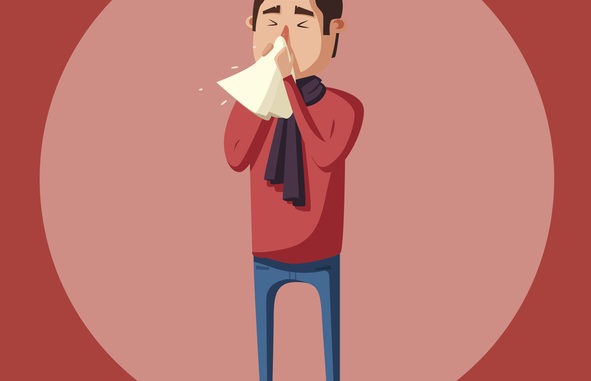
The government has announced a vigorous influenza vaccination campaign this year, making it available to 35m people. With the COVID situation unpredictable and cases likely to continue to rise, a serious outbreak of ‘flu could have devastating effects for the elderly and infirm. Last year, the number of cases was fortunately low because of lockdown and social distancing but this year could be different, writes Dr Paul Lambden
Every year between 250,000 and 700,000 people die of seasonal ‘flu worldwide. During the last ‘flu pandemic of 1918-19, a strain of the H1N1 influenza virus is estimated to have killed 50m people across the globe.
The discovery that ‘flu was caused by a virus in the 1930s led to the first vaccine at the end of the decade. Since then, techniques of preparation and manufacture have made the vaccine purer and with fewer side effects. Vaccines have become more effective and the recognition that viral strains mutate has resulted in the inclusion of several active influenza strains in the vaccine and updating of the vaccine on a regular basis. This year, some vulnerable groups may be eligible to receive a COVID-19 booster as well as influenza vaccine, though this is yet to be confirmed by the government.
Vaccines can be manufactured in several ways:
Egg-Based ‘Flu Vaccines have been used for about 80 years. The viruses are injected into fertilised hens’ eggs and harvested when they have replicated. The viruses are inactivated (killed) and the vaccine is purified.
Cell-Based ‘Flu Vaccines involve the injection of the identified viruses into cultured mammalian cells and they are collected after a few days when replication has occurred. No eggs are involved in the process. Once collected they are inactivated and purified.
There is also a Recombinant Vaccine, which is manufactured synthetically following identification of the DNA of the causative viruses. It does not involve growing the virus. The DNA is combined with a harmless baculovirus to be formulated and concentrated and it is then cultured and purified. Currently the vaccine does not have UK marketing authorisation but is approved for temporary supply by the Department of Health and Social Care. It is approved by the Food and Drugs Administration in America under the tradename Flublok. It is used in adults between 50 and 64.
The best time to have an influenza vaccine is in the autumn before the ‘flu virus starts spreading. This year it will be more important than ever because of the circulation of coronavirus. There is no doubt that acquiring ‘flu and coronavirus at the same time will result in sufferers becoming more seriously ill and with increased risk of death.
The vaccine will be obtainable at the GP surgery or at a pharmacy which provides the service. Midwives can administer the vaccine to pregnant women.
Priority groups include:
- Anyone over 50.
- People with long-term health conditions such as respiratory disease (e.g. asthma, bronchitis or COPD), heart, kidney or liver disease or neurological diseases such as Parkinson’s, motor neurone disease, multiple sclerosis or cerebral palsy.
- Those with weakened immune systems such as when taking steroid drugs, undergoing chemotherapy or with HIV or AIDS.
- Obesity with a BMI of above 40.
- Frontline healthcare workers should have the ‘flu vaccine.
Safety of flu vaccines
The vaccines are very safe. Generally, if experiencing any side effects, they are mild and may be a sore arm at the site of injection, muscle aching or a raised temperature. They only last a day or two.
It is important to re-emphasise that none of the ‘flu vaccines contain live virus. It is not possible to catch ‘flu from a vaccine. Anyone developing the illness shortly after receiving a vaccination almost certainly already has the disease.
Having a ‘flu vaccine does not make the individual immune from the disease. It is still possible to catch it but it is likely to be milder and of shorter duration. The vaccine also makes the disease less transmissible.
Some people should not have a ‘flu vaccine
- Those who have experienced a serious allergic reaction
- Those patients who already have signs of viral infection, such as a high temperature, muscle aches, etc. Such people should wait until they are well again.
Anyone with a known allergy to egg, should ensure that they have a vaccine which avoids the use of egg in its preparation.
Coronavirus has tested the patience of a saint, but, if this proves to be a bad year for influenza too, we may see marked rises in very ill people, admissions and deaths with all the consequences for other hospital services and the fragile and still embryonic industrial and economic recovery.
The only advice must be to ensure that, if eligible, everyone has had the coronavirus vaccine and the influenza vaccine. Then perhaps we have half a chance of avoiding an extended pandemic, many deaths, the possible collapse of the NHS and disastrous effects on business and industry.
Dr Paul Lambden BSc MB BS BDS FDSRCSEng MRCSEng LRCPLond DRCOG MHSM

Be the first to comment